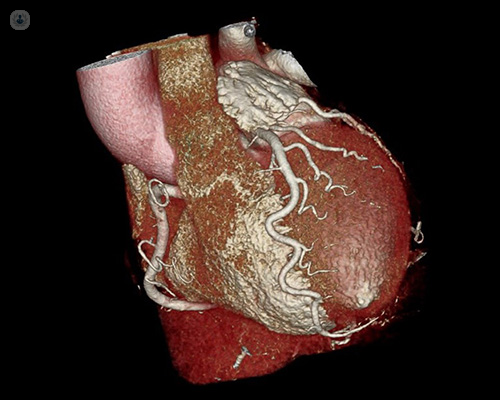The benefits of a coronary CT
Written by:Coronary CT has been revolutionary in helping answer the age-old question of whether chest pain is due to angina or not. The quality of the test has improved so much that it has become the go-to test for cardiologists.

What are the benefits of a coronary CT scan?
It is quick and simple with very low risk. If the test is normal, the certainty this gives in knowing you do not have coronary artery disease is unsurpassed by any other test. It is so sensitive to the disease that it can pick up mild furring of the arteries that would be missed even on invasive coronary angiography.
We know from studies of patients in Scotland that identifying even mild coronary disease can make a big difference to your health – if this is found, starting on statins and aspirin will reduce your chance of having a heart attack or stroke.
Conversely, if your scan is entirely normal then you may not need statins, even if your cholesterol is relatively high.
Finally, if you do have a significant disease in your arteries, the cardiac CT can guide what the treatment options should be and whether you should have other tests on your heart.
What are the risks?
The contrast dye used can cause an allergic reaction – this is very rare. If you have had problems with CT scans or dye injections before, you must tell the cardiologist or radiographer before you have the scan.
The dye can also strain the kidneys if they are already poorly. This is usually temporary but if your kidneys are very poorly, a CT scan may not be the safest test. Your cardiologist will always look for a recent kidney blood test to make sure a cardiac CT is safe.
The x-ray radiation used in modern cardiac CT is very small. It is similar to the amount of natural radiation you receive in a few years.
What does a cardiac CT involve?
You will be asked to arrive a short time before the scan appointment time. Blood is normally dark on a CT scan so to show the arteries clearly, we need to inject a special contrast dye in your veins just before the scan itself. A nurse or radiographer will place a small cannula into a vein in your arm and flush it with salt water.
The scanner table slides out of the CT scanner and you will be asked to lie down on it. Sticky ECG tabs will be put on your chest and arms – this will allow the scanner to monitor your heartbeat and get the timing of the scan just right.
The ideal heartbeat for a scan is just below 60 beats per minute. Most people have a resting heart rate of about 70 so need some medication to slow it. Some CT departments will send you out a few tablets to take just before the scan. This is usually a beta-blocker tablet and will slow your heart. If your heart is still too fast on the day, you may get an injection of beta-blocker medication while you are lying down. You may also get a spray or tablet of GTN to put under your tongue – this makes the arteries a little larger and easier to see.
When your heartbeat is nice and slow, the table will slide inside the scanner and you will be asked to put your arms above your head. The scanner will take a quick picture of your chest so the radiographer can line everything up to focus just on your heart.
You will be asked to breathe in and hold your breath. This is just for a few seconds as a practice run. If everything looks good for the scan, the dye will be injected and you will get another request to breathe in and hold your breath. You should hold it until instructed to breath away – this is now a very short time with the latest scanners. When the contrast dye is injected, you may feel a warm sensation pass over your body – this is quite normal and you should try to ignore it and concentrate on keeping still and holding your breath.
After the scan, you will be disconnected from the dye pump, sat up and the cannula removed from your arm. You will be asked to have a seat outside for a short time to make sure you have no after effects before you head off.
The scan itself will be reviewed later so the results won’t be available immediately. Cardiac CT scans are generally reviewed by both a cardiologist and radiologist so that you get a comprehensive report.


